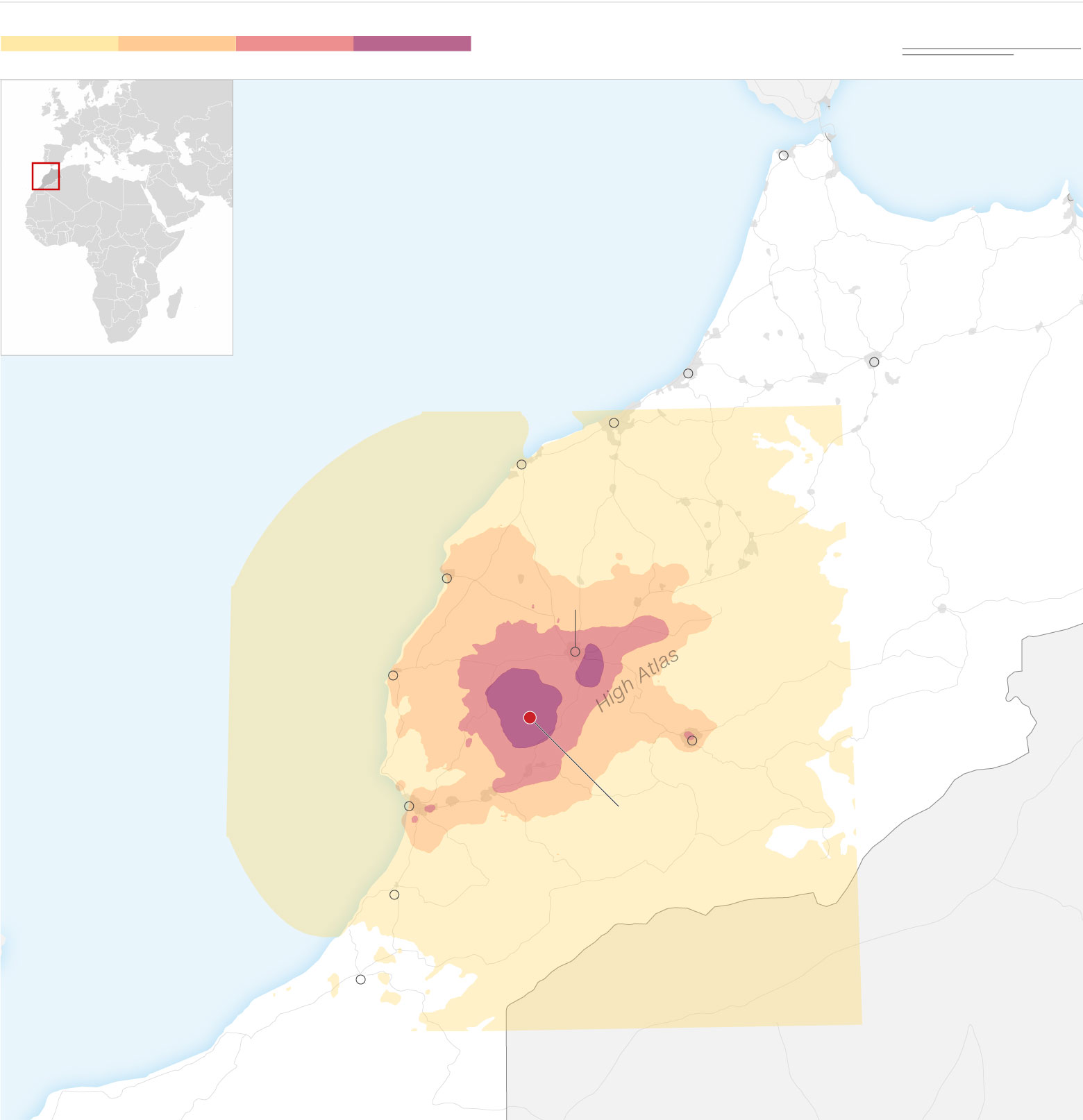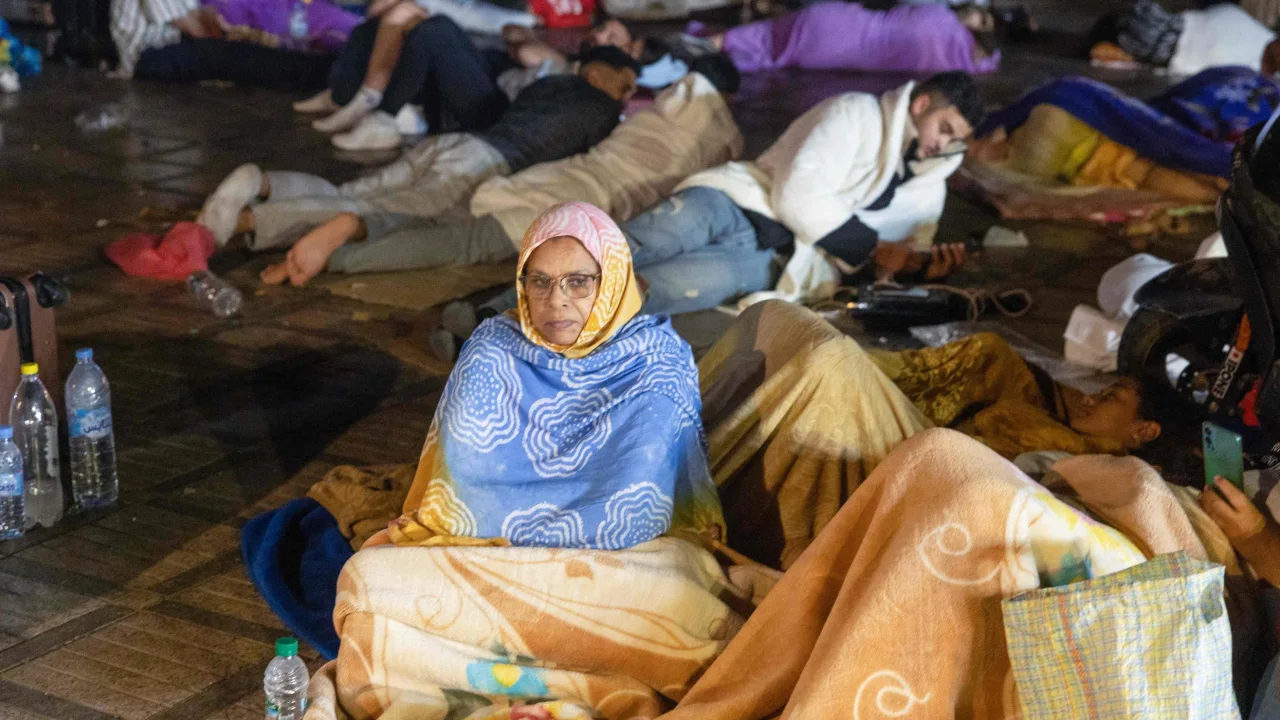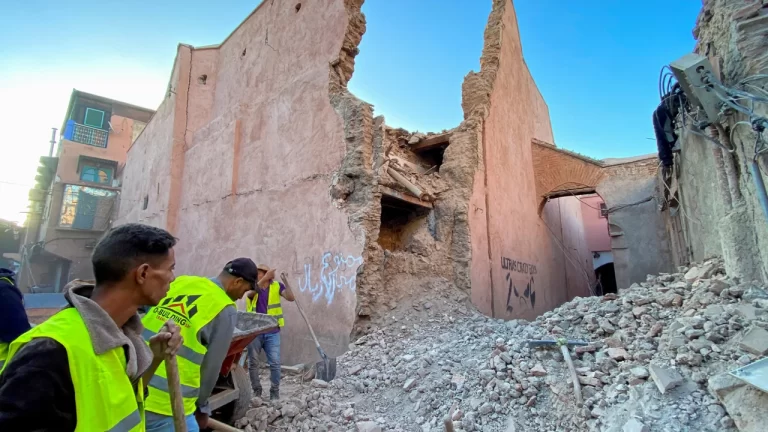More than 2,000 people have died after a powerful earthquake struck the North African country of Morocco on Friday night. Thousands have been injured. The quake is the strongest to hit the nation’s center in more than a century, and its epicenter was not far from popular tourist and economic hub Marrakech.
At least 2,122 people have been killed in the disaster and 2,421 have been injured, state-run broadcaster 2M said Sunday.
Here’s what we know so far.
When and where did the quake hit?
The earthquake struck at around 11.11 p.m. local time (6.11 p.m ET). Its epicenter was located in the High Atlas mountain range, about 72 kilometers (44.7 miles) southwest of Marrakech, a city of about 840,000 people.
But its impact was felt as far north as Casablanca, as this map shows.

How strong was the quake?
The quake had a magnitude of 6.8, meaning it is classed as “strong.” It also struck at a relatively shallow depth, making it more destructive.
Earthquakes of this size in the region are uncommon, according to the US Geological Survey, but not unexpected. It noted that nine quakes with a magnitude of 5 or higher have hit the area since 1900, but none of them have had a magnitude higher than 6. The earthquake is Morocco’s deadliest since 1960 when a quake killed more than 12,000 people.
Where is the worst damage?
More than 300,000 people have been affected in Marrakech and surrounding areas, according to the WHO. Historic sites have been damaged, but the hardest-hit areas are those nearest to the Atlas Mountains. Eyewitnesses in the foothills of the mountains said some towns are completely destroyed, with almost all the homes in an area of the village of Asni damaged.
More than a thousand people have died in the province of Al Haouz and more than 400 perished in the southwestern Moroccan city of Taroudant.
The precise scale of the quake is still emerging.
What’s happening on the ground?
Emergency workers were deployed to affected regions, despite some roads being damaged or blocked by debris. Some remote villages on the foothills of the mountain have been hard to access. Mohammed, 50, from the town of Ouirgane, lost four family members in the quake. “I managed to get out safely with my two children but lost the rest. My house is gone.” he said.
Rescue operations are still ongoing. “We are out in the streets with authorities as they try to pull the dead from the rubble. Many many people were transported to hospital in front of me. We are hoping for miracles from the rubble” he said.
In Marrakech, some residents spent Saturday night on the streets, afraid to return to their homes. Others fled the city altogether. There have been warnings of aftershocks. Morocco’s government said it had activated all available resources to tackle the quake and urged people to “avoid panic.”
King Mohammed VI of Morocco ordered that a relief commission be set up to distribute aid to survivors, including orphans and people who lost their homes in the disaster. He also declared three days of national mourning and ordered mosques nationwide to hold funeral prayers, known as ‘Janazah’ prayers, at noon on Sunday for those killed.
What’s the international reaction been?
Many world leaders have expressed their commiserations, as well as offered support to Morocco. France has activated emergency aid from local government funds to help with humanitarian operations in quake-affected regions.
A Spanish search and rescue team, made up of 56 soldiers and four dogs, landed in Marrakech to help in the quake’s aftermath, according to Spain’s defense ministry. Turkey, which was hit by a devastating earthquake that killed tens of thousands earlier this year, said it was ready to send 265 personnel and 1,000 tents to Morocco to support aid efforts.

Britain said it has deployed 60 search and rescue specialists, including four search dogs, rescue equipment and a medical assessment team to Morocco.
Algeria, which severed diplomatic ties with Morocco in 2021 and closed its airspace to all planes registered in Morocco, said it would reopen its airspace for humanitarian aid and medical flights going to and from the Arab nation.
The United Nations and US President Joe Biden have also said they are ready to provide assistance, and the World Bank has said it has offered the country its “full support.”
Many other world leaders, including Indian Prime Minister Narendra Modi at the G20, Chinese leader Xi Jinping, Ukrainian President Volodymyr Zelensky and Russian President Vladimir Putin, have sent their condolences. Morocco’s King Mohammed VI thanked Spain, Qatar, Britain and the United Arab Emirates for sending aid following the earthquake, state-run broadcaster al-Aoula reported Sunday.
In a statement posted by state broadcaster 2M, the Interior Ministry said the country might also accept some of the other offers of support it had received “from friendly countries,” depending on its future needs.
— CutC by cnn.com


